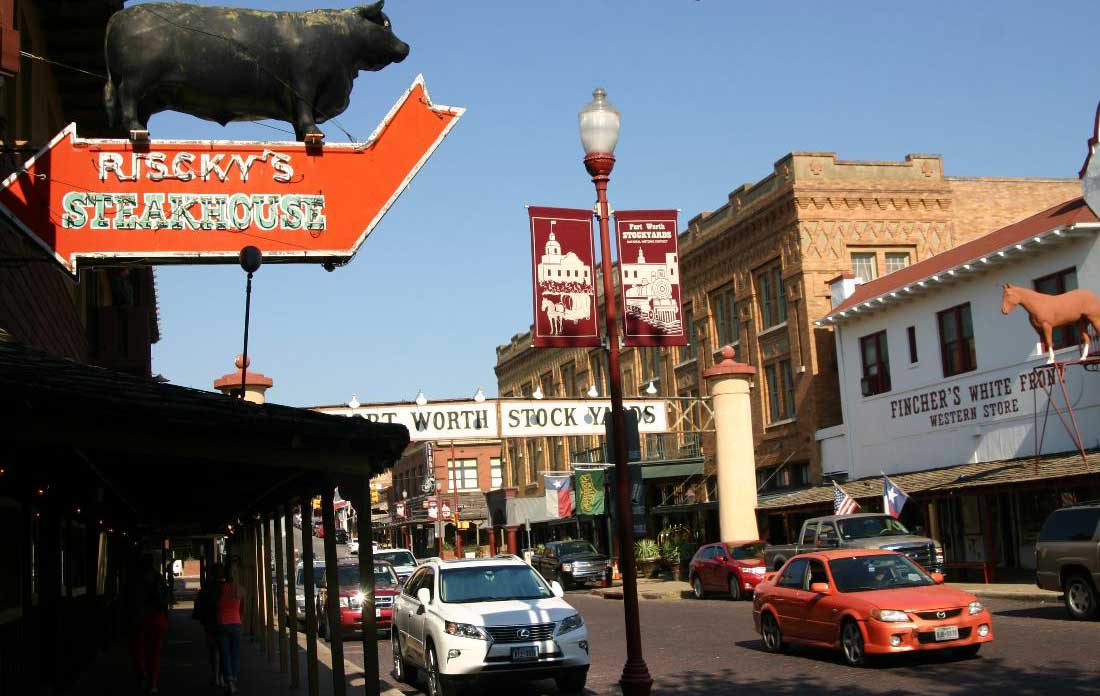The man with the big cowboy hat who manages Leddy’s boot store in the Stockyards presents a sharp figure. Mark Dunlap’s clothes are starched and ironed. His white hat is clean, creases sharp. The store is immaculate. He runs a tight ship.
Dunlap expects no less from city leaders, Holt Hickman, and a California-based realty group in their push for an ambitious, million-square-foot project combining retail, offices, and residential spaces. The $175 million redevelopment plan would take in much of the Stockyards’ east end including Stockyards Station, mule barns and cattle pens, and the boarded-up and falling-down Swift-Armour meatpacking plant near Niles City Boulevard.
“We’re concerned about traffic and what type of new development might come in,” Dunlap said. “Nobody has seen a map of what this will truly look like.”
Another concern for some Stockyards enthusiasts is whether the city’s decision to create new zoning will pave the way for casino gambling, should it ever be legalized in a statewide vote.
“We want to make sure it will never happen in the Stockyards,” local historian Pete Charlton said. “There is no perception that casino gambling is imminent. There are a lot of people who don’t want to see it, but there are a lot of business owners like Hickman, who would jump at it in a moment.”
The Fort Worth City Council decided in June to kick in about $26 million in incentives toward the proposed development that also includes a hotel. In July, the council established a temporary zoning overlay that requires developers to submit site plans for city council approval.
The property’s previous “heavy industrial” zoning would allow many types of development unsuitable for a historic and tourist-friendly district. City officials wanted to change the zoning to give the city more control, but fast-tracked the decision with little public input, which worried some residents and Stockyards business owners.
While the interim zoning is in place, the council will appoint an advisory committee to come up with a form-based zoning proposal to establish criteria for buildings, landscaping, and infrastructure in the area. Form-based regulations can determine how a building looks and the way it’s landscaped and illuminated.
“As long as the committee … does their job properly and gets information from people here in the Stockyards and follows those wishes to some extent, I think everybody will be happy,” Dunlap said.
City council member Ann Zadeh, at her first council meeting after being elected to represent District 9, was the lone dissenting vote against establishing the interim zoning. Her district includes the Near Southside and downtown but none of the Stockyards. She preferred to jump straight to the tougher, form-based code, which is what many Stockyards proponents also sought. Still, Zadeh said, she has confidence that city leaders will protect the hallowed Stockyards.
“There are a lot of eyes on this right now, and everybody has the best interests of the Stockyards in mind,” she said.
In other words, the city is asking people to trust them. But many observers hesitate to place their trust in a California company. Hickman, for the most part, has adhered to the Stockyards’ long-established Western theme and earned the trust of purists over the years. But he’s in poor health. His children are more involved in Hickman Companies than he is these days, and they haven’t established that same level of trust with fellow Stockyards dwellers.
Hickman’s 30-year history of development in the Stockyards makes it seem doubtful that his company and the developer, Majestic Realty Co., would try to plop golden arches, big-box stores, or cheap apartment complexes there. Hickman has established a museum, hotel, and shopping area that blend well into the Western ambiance. The name of the partnership formed by Hickman and Majestic –– Fort Worth Heritage Development LLC –– seems designed to establish confidence that the development will pay homage to the area’s legacy.
“We not only embrace this authentic cowboy culture and history but will strive to preserve and enhance it and, in some cases, restore it,” Majestic executive vice president Craig Cavileer wrote in a statement to Mayor Betsy Price in June. “As the largest landowner in the Stockyards, the Majestic-Hickman partnership understands the importance and significance of our responsibility with this iconic and historic property.”
However, more than a few locals worry that Hickman and Majestic will take advantage of zoning loopholes and establish a “placeholder” for a future casino, said Charlton, a longtime member of the North Fort Worth Historical Society. That group maintains an independent voice, Charlton said, but also leases its building from Hickman and has limited funding and political power. Charlton said he was speaking to Fort Worth Weekly as a historian, not on behalf of the historical society.
“The Hickmans own and control so much of the Stockyards [that] it’s hard for the people who are in the Stockyards to say anything,” Charlton said. “You can’t get a full voice because everything is a little bit smothered.”
A local couple, Sue and Charlie McCafferty, founded the nonprofit group in 1976 to protect the area’s historical accuracy. The McCaffertys are dead now, but for years they butted heads with Hickman and other property owners over various developments, often convincing developers to alter plans. Historical society members and others are trying to maintain that pressure.
“We are not adversaries to those that wish to develop the Stockyards. We want to work together,” said Teresa Burleson, director of the Stockyards Museum and an administrative assistant for the historical society. “And the North Fort Worth Historical Society will do everything we can when it comes to preserving our heritage.”
After the city council changed zoning from heavy industrial to mixed-use/ planned development, Charlton posted a warning on his Facebook page: “Underlying all this and carefully unsaid by the interested parties is the very real possibility that part of this land is being prepped for casino gambling when and if it comes to Texas.”
The post prompted numerous comments, most expressing strong opposition to gambling in the Stockyards. Other comments noted that casinos can be excluded through zoning and urged people to call city council members and the mayor to express their thoughts.
Charlton and others haven’t forgotten how Hickman spoke in favor of casino gambling in the 1980s as he was buying up land and becoming the Stockyards’ primary property owner. Advocates pushed for legalized gambling back then, and they continue to push today. That would require action by the Texas Legislature; thus far none of numerous bills on the topic has succeeded.
“The concerns are the same as they have been since the beginning when Hickman came in,” Charlton said.
Brad Hickman, vice president of Hickman Companies, was unavailable for comment at press time.
Developers for years have eyed the so-called “ruins” on the east end of the Stockyards — the dilapidated Swift-Armour plant and old pens. Proponents say gaming would boost the economy and tax base and keep money from slipping to bordering states with casinos. Opponents worry about crime and societal issues associated with gambling.
“This open-zoning thing the city has come up with just leaves a hole and says. ‘OK, we can push for the casinos any time we want,’ ” Charlton said. “I don’t think casinos belong in the Stockyards. It would ruin the whole thing. The Stockyards depend on an atmosphere, a feel, a personal appeal that is different than what you find at Winstar or over in Shreveport.”
He doesn’t buy the argument that gambling was a part of the Stockyards in the old days. Card games were held in a building or two, such as in the basement space that is now The Bull Ring ice cream shop. But that’s different from a casino, Charlton said.
“It wasn’t organized,” he said. “Even in the period of the 1930s to 1950s when the criminal element was running over everything, there was no mention in the paper of organized gambling and raids in the Stockyards area. There was some loosely organized gambling and drinking during Prohibition, but I don’t think it was a part of the whole atmosphere, and particularly it’s not a part of the atmosphere now. [The area] is aimed at families.”
City council member Sal Espino’s district includes the Stockyards, and he said city leaders are aware of residents’ and business owners’ concerns. Espino said residents can count on current and future zoning to include safeguards. Casinos are a long shot in Texas, at least for now, he said. Casino gambling would require an amendment to the Texas Constitution, which would have to be approved not only by the legislature but by voters in a statewide referendum. Any such bill would likely contain language to allow cities to decide for themselves whether to allow casinos, he said.
“I just don’t see casino gambling making it through all those hoops,” he said.
But if such a bill were to pass, would Espino support casino gambling in the Stockyards?
“Any gambling initiative would also likely involve a local option election, and the voters in Fort Worth would have the final say in the matter,” he said.













Winstar staff is bragging it has taken in 2 Billion dollars in Texas Money in last 3 years. I believe that number because their Parking lot is always full and it is 90% Texans…just saying Fort Worth could use that money!
So they’re concerned the Stockyards could turn into the Wild Wild West?
“However, more than a few locals worry that Hickman and Majestic will take advantage of zoning loopholes and establish a “placeholder” for a future casino, said Charlton, a longtime member of the North Fort Worth Historical Society. That group maintains an independent voice, Charlton said, but also leases its building from Hickman and has limited funding and political power. Charlton said he was speaking to Fort Worth Weekly as a historian, not on behalf of the historical society.”
It’s easy to see who Charlton is a mouthpiece for.
It’s all to do with bringing gambling to the Stockyards.